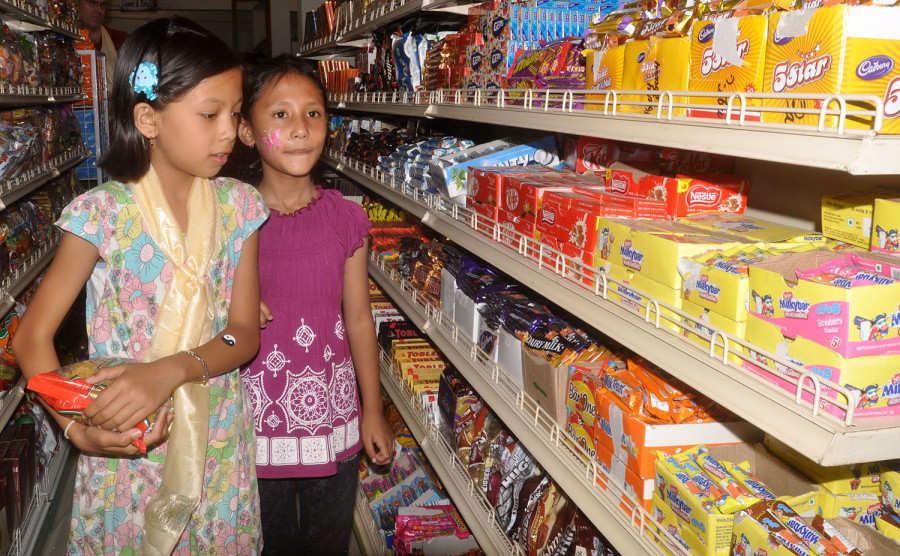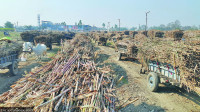Money
Nervous consumers drive demand for packaged goods and beverages
With people allowed to buy only essential products online, they have begun to stockpile food products, traders say.
Krishana Prasain
Different parts of the country are under partial and total lockdown in response to a brutal second wave of Covid-19.
With people ordered to remain indoors and allowed to buy only products categorised as essential online, they have begun to store food products, leading to a surge in demand for fast-moving consumer goods (FMCG), particularly consumer packaged goods and beverages, traders said. Most FMCGs have been classified as essential items.
Insiders say the consumption of domestically produced packaged goods soared in both rural and urban areas after the pandemic started last year. With the southern border points closed, the flow of contraband FMCGs into the country stopped, and people started buying local products.
At the same time, people cooped up in their homes unable to eat out have taken to packaged foods as they are good for instant consumption. Many people are now working from home, and they have less time to spend on cooking. So they see packaged foods as the next best thing, traders said.
Dinesh Shrestha, vice-president of the Federation of Nepalese Chambers of Commerce and Industry, said the consumption of FMCGs was high in urban areas as they are ready to eat and can be stored for a long time.
There is no authentic data regarding demand and supply, but there is a tendency among people to store such products, leading to alternating rise and fall in demand, Shrestha said.
“The manufacturers have been setting their production goals as per demand, and output has increased in response to the rise in sales,” he said.
Surakchya Adhikari, chief operating officer and co-founder of online supermarket Thulo.Com, says the consumption of fast moving consumer goods has doubled compared to normal times with people stockpiling such products.
Sales of products like baby foods and packaged foods, especially bakery products, noodles, biscuits, confectionery, chips and beverages have increased twofold, she said. “Consumers are buying extra packets of packaged food compared to normal times,” she said.
Consumer behaviour has changed following the recent restriction order due to last year’s experience of the months-long lockdown. People are stockpiling food items, Adhikari said.
Parash Shakya, executive director of Bhuramal Lunkarandas Conglomerate, said that uncertainties will always create an increase in demand because there is always fear in the people's minds. They are thinking about what will happen next, and they want to make sure that they have sufficient stocks of food that is consumed on a daily basis.
“The fear factor among the public will lead to a surge in demand for essential products if the current situation extends for a long time,” he said.
According to Tikendra Kumar Shiwakoti, country sales manager of Asian Biscuit and Confectionery, domestic manufacturers have been introducing new products as per consumer demand, due to which consumption is growing at a fast pace.
He said that demand for domestically produced biscuits increased after the southern border was tightened.
"The maximum retail price of noodles has increased by 15 percent since the pandemic due to higher raw material costs and transportation charges," Shiwakoti said.
The second wave of the Covid-19 pandemic has certainly become the biggest challenge for the manufacture and supply of goods.
Anticipating a rise in future demand, some FMCG manufacturers plan to increase their production capacity. Asian Biscuit and Confectionery aims to boost its production capacity by 25-30 percent.
Shrestha said that supply and production faced a setback due to labour shortages. Shiwakoti expressed a similar view, adding that prohibitory orders in different districts had begun to impact production and supply.
As always happens for lack of coordination between different government entities, supply has not been regular, Shrestha said.
Though there is no problem with regard to the production of fast moving consumer goods currently, problems might occur in operating the factory if the caseloads swell and the government imposes stricter controls, manufacturers said.
The onset of summer has pushed up demand for personal care items, especially hand sanitisers and disinfectants, and beverages in both urban and rural markets of the country.
According to the second quarter report of Unilever Nepal, the company’s net profit for the quarter declined by 44 percent to Rs131.45 million due to loss of margin from revenue degrowth due to Covid-19.
The net profit of Bottlers Nepal in the second quarter of the fiscal year amounted to Rs422.56 million, up from Rs106.74 million during the same period last year.




 20.81°C Kathmandu
20.81°C Kathmandu













